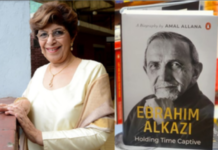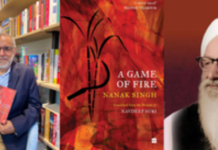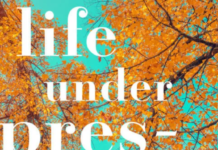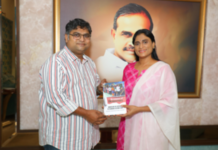Thiruvananthapuram– A Kerala doctor Hari Kumar who studied medicine in the erstwhile USSR, after decades re-lives his life and times, like experimenting with vodka, surviving the bitter winter and falling in love with Russian culture.
Incidentally it’s through his book, ‘A different degree’, released recently that he traces his life and times, which he in one sentence describes, ‘a unique perspective of life as an international student in 1970s Soviet Moscow. It is made all the more vibrant by the loving, sincere and honest people he met and the permanent impressions they made on his life’.
Kumar, now an orthopaedic surgeon lives with his family in London.
Looking back at his life, he told IANS that it was in the early 1970s, a seventeen year old Indian boy left his village from Kerala to study medicine in the USSR.
“I, then had never travelled outside my village on my own before and knew nothing of Soviet culture, or one word of the Russian language,” said Kumar.
But after nine years and becoming a doctor in 1980, Hari learned fluent Russian and returned to India, married and then made another move to the UK – where he lives to this day with his family.
Incidentally 35 years later, he went back to Moscow briefly for a reunion of his medical school batch and he says, Moscow was a completely different city, as it had become the capital of a capitalist country.
Upon reuniting with old friends and recounting their experiences, they kept returning to the same underlying question; “Was life better for the common man under Communism or in today’s capitalist Russia?”
“It is by no means a simple question, but is one which inspired me to unpick within my book, ‘A Different Degree’,” said Kumar.
Although the book is about the life of a medical student behind the iron curtain, it is written with clarity and simplicity for everyone to understand and enjoy.
He describes the fun of living in an international community of students and narrates his interesting trips to cities within the USSR and to London and Paris. While feeling homesick, he remembers his joyous childhood and exciting times in boarding schools back in India.
Hari recounts intimate observations of the lives and habits of the Soviet people, their joys, frustrations and hopes. They lived good lives without having to worry about food and shelter or even crime, despite the controls and queues.
Soviet citizens, remarkably, kept their humour and this book is sprinkled with moments of merriment and characteristically understated Russian jokes.
Hari introduces readers to the richness of Russian song and poetry with some sublime English translations.
“There is something about Moscow that tends to attract you back like a magnet. It must be the warmth and genuineness of the people,” reflects Hari. (IANS)














